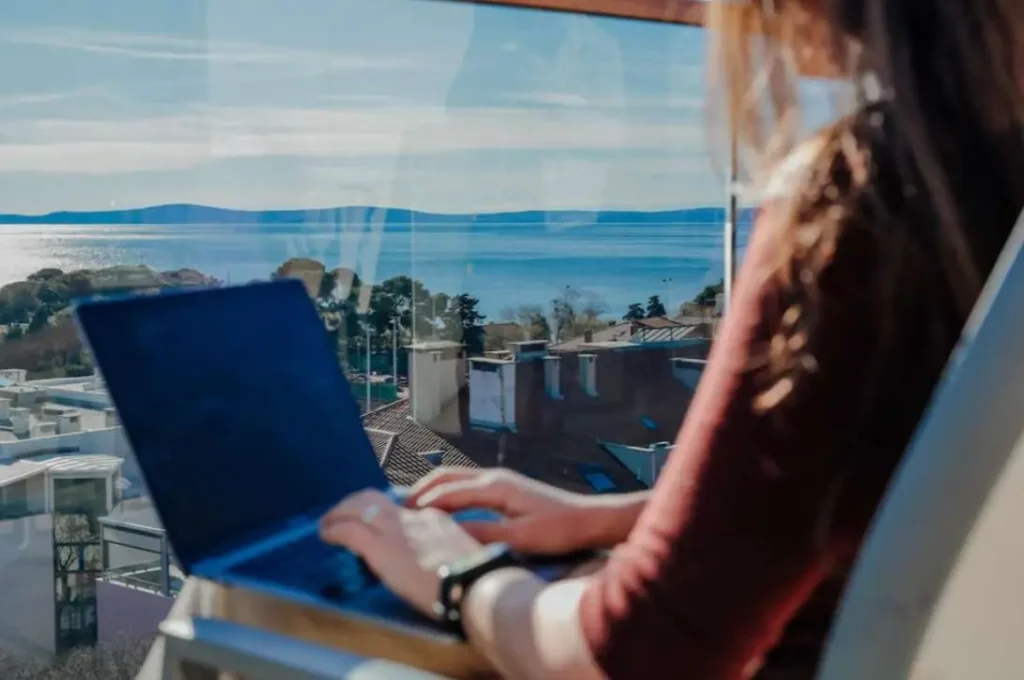Pivots are increasingly common in the COVID19 era. Hotels are no exception.
In Croatia, especially the tourism sector, a lot of businesses are looking at catering to Digital Nomads. It’s no wonder hotels are here, too. And yet — they have polar pros and cons.
However, there are ways hotels can adjust immediately, and over time to create the best offer possible. These points are covered at the end of the article:
- Injecting Soul.
- Food. (Part1and2).
- Upgrades.
- HappyHour.
- Learningandengaging.
Why are hotels now doing this?
- Croatia has introduced a digital nomad permit, allowing tax-free stays for 1 year.
- It’s a great place… and can have a year-round offer – filling many empty coastal hotels closed in the “off-season”.
- Digital nomads are looking for long-term stays.
CAPTION: Soo and Chris —2020 Saltwater members were recruited to model for Marvie Hotel Split’s longstay deals for digital nomads in Croatia
The backstory.
What were hotels doing before COVID?
Many hotels already had ‘business centres’ or small areas for people to work in rooms or common areas. This isn’t a cowork, or a hub concept, it was a place to plug in. Maybe print things. End of story.
What was interesting by 2019 was the rise of coworking – gaining the attention of hotels. And entire hotel chains were moving into this direction. I recall reading in May 2019 about Accor group launching over 1200 spaces in Europe with Wojo as a coworking partner.
Later that year, (still pre-COVID), our business, Saltwater, partnered with Davina at Residence Stine and soon to open Heritage Hotel Fermai. They immediately said ‘yes’ to longstay packages for remote workers, and jointly offered the Breakfast Room (a glass garden oasis in the heart of Varoš in Split) as a coworking space.
CAPTION: July 2020, our coworking partnership with Residence Stine’s indoor-outdoor glass garden
We launched in COVID19, and I recall the first member ordering breakfast on his first day, as he logged on to read emails. I was concerned it would seem a bit odd —but for 8 euro (and no dishes to wash) it was actually a bonus, and an efficient start to the day.
Due to COVID19, and Summer not being the ‘season’ for digital nomads in Split (expensive rentals), that was that. Until Jan de Jong came in and the digital nomad visa permit was born. Remote work was truly mainstream. Globally.
You know the rest.
COVID-ERA PIVOTS
The first I heard of a global pivot was a partnership announced in July 2020 between Wythe Hotel Brooklyn and Industrious —one of the most respected cowork chains now that WeWork… well, didn’t work! The Wythe Hotel converted entire suites into offices. I was at the Wythe in 2013, and this is a hotel with a rooftop looking out on Manhattan, with a lot of events, including business speakers. The Australian American Association actually held events there, which is what brought me there for a talk by the Australian (and female) co-founder of Van Leeuwen ice creams. I digress… but it clearly demonstrates this is a space which knew back then how to get in non-hotel guests — which is something Croatia does not do well.
This will hopefully change.
THE FIRST COVID OFF-SEASON IN CROATIA.
I read the first stories of hotels starting to offer long-stay options in Croatia toward the end of October last year.
There were a few glaring issues here.
These were places in ghost towns, with probably a very stark hotel restaurant, and at a time when apartment accommodation would be much cheaper – and come with a kitchen.
While it was good to see a shift to accept a remote work audience, it was, for the most part, a misinformed approach. Retrofitting a guest with specific needs to an unsuitable space, and, no community vibe. I’d be interested to see the reviews and data on those places.
What could they do better?
Know these aren’t spaces built for long stay, but work to their strengths, and make adjustments as needed, after testing.
This is a transitional period. Some, like the Wythe Hotel, will need to convert floors into offices if they are to attract this audience. Or at least create a new space from unused conference halls. Hot tip: not the dark, basement room. Just because it is empty – does not make it a good place to sit and work for 8 hours.
This is a common mistake.
There is something about a coworking space, when done right, will make you actually enjoy going to work. It’s the decor, sure. Location, and if lucky, a very short commute.
Above all, it’s the people.
DISTRIBUTED TEAMS
A recent digital nomad member we hosted at Saltwater is a specialist in distributed teams. We were chatting by the watercooler one day — and he said something which really struck me, (even if I have to paraphrase).
“Everyone is feeling so isolated, working from home right now.
When the ‘off-sites’ start happening — workers don’t want a sterile hotel vibe, and to once again, “isolate” in their hotel rooms and the ‘polished’ pool feel and staff. They want connection. They want the shared house style option, where they can do things like prepare a meal together.
Connect — and join local gatherings.
It’s not rocket science. It’s what we do every day, to ensure members get value. So here’s a quick checklist:
IF YOU’RE A HOTEL
- Inject some soul. Hold events for non-guests. There are hotels with a health and wellness angle such as Marvie in Split, or weekly live music nights at family-owned Hotel Park Hvar. I visited waterfront Hotel Split in Podstrana last week — which have an existing artist-in-residence program, where a local artist comes in for a few days, and the works are displayed around the hotel and for sale. Events, such as the Wythe Hotel program, will bring the community vibe you need. And you can make it easier, by offering it to the public to hold events, to take the load off your staff.
Opening up doors to non-guests — especially ones who live in your region, not just conference bookings by international M.I.C.E. arrivals, not only advertises your hotel to a wider audience, it will show the local commitment you make, which is valued by digital nomads. And the locals will become ambassadors will get to know, and ultimately be the ones to recommend your venue.
-
Food — part 1. Self Catering.
Living in a room with no kitchen for a month, with makeshift Mr Bean style sandwich making, isn’t appealing to everyone. Most hotels only have a tiny bar fridge. And the costs of constantly ordering in or dining out (to your wallet and health) is a challenge for hotels to overcome. Consider adding larger fridges and simple food preparation options in rooms: a cutting board, cutlery, plates, bowl and tea towels. And a system for collection and cleaning. Kind of like a DIY room service.
- Opening a meals area — eg. if your pool or a bar area is closed in winter, a small kitchenette is ideal, and maybe already installed or can be relocated. Common meal prep areas are…common, for digital nomads.
Put yourself in people’s shoes: if you had to stay somewhere for a month, making a sandwich, smoothie or salad could make you feel more at home.
-
Food — Part 2. Group meals.
Give guests the chance to meet each other. Things like a weekly group-contributed barbecue outdoors is easy, and perhaps already at your venue. Or hold a set dinnertime and menu on certain days. Ensure there is a host joining the group from the hotel (not just a server!) or from your local community, and bring in ways for people to get to know each other; speed networking, a local speaker, open mic, etc.
-
Upgrades.
Consider — in time, adding kitchen fitouts in some rooms, or the outdoor barbecue example. A lot of hotels are trying to retro-fit digital nomads into their spaces. Sorry. You weren’t designed for long-stay — some things just do not work as your space is currently designed. Remote work is here to stay — an ergonomic chair in rooms (or on the menu) is now a necessity.
-
Massage and Happy Hours.
This tip was from Kashlee Kucheran of Travel off Path a keynote speaker at our Dubrovnik for Digital Nomads conference. Hotels in Mexico and the Dominican Republic were serving the remote working crowd in the peak of COVID by modifying their offer with long-stay pricing. The good ones offered services professionals usually might use — eg. a chiropractor or midday massage. Holding after-work happy hours. If you don’t have the in-house staff, invite local providers in to do this. Call your drinks rep to sponsor the event. Anything. Give something more than the room key.
- Learn. Ask questions. Jump on expat and digital nomad online groups. They’re on Facebook, LinkedIn, Slack…And offer something in return for people’s insights — like a discount. They may not stay a month, but a weekend getaway is appealing. And once they’re in, you’ll learn more about what can work.
A very long stay in a hotel may not be for everyone. If you are landing in a new place and want to get your bearings, some of the longstay deals hotels in Croatia are now offering are a real luxury way to start your digital nomad experience in Croatia. You might use it as a base to find your long-term rental, or just want to live it up for a month with room service, with somewhere like Dubrovnik as your office for the month.
I’m excited to see all these changes in Croatia, and happy to be working with the hotels who have been early adopters, reached out to us at Saltwater and seen how they can welcome this audience, and build the digital nomad community in places across Croatia.
It’s an interesting time for this sector in particular, and hotels are certainly an important part of elevating a city’s status.
If you found this interesting — and would like to learn more about how Saltwater can work with your hotel (through referring your long-stay accommodation package to our members or how to put in a coworking space), visit our website Saltwaternomads.com or reach out on LinkedIn.
This piece is modified from Tanja Polegubic’s blog on Medium. Reprinted with permission.
More on digital nomads:
Meet Melissa Paul, Owner of Croatia’s First Digital Nomad Visa.
For the latest on digital nomads in Croatia, follow the dedicated TCN section.











